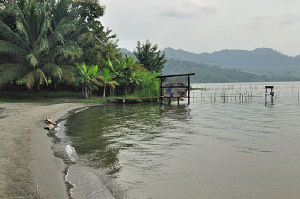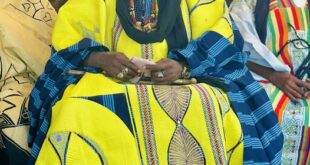Project Coordinator Fred Kyei Sarpong explained the projection was based on a German study, which revealed that “the fast rate of the ongoing deforestation and other human activities around the lake may shrink its water in the next 11 years if drastic measures are not taken”.
This caution comes as a private developer felled and destroyed over 500 trees planted along the bank of the Lake at Pipie, a community surrounding the lake, a situation authorities say it’s in sharp contrast to bye-laws of the local assembly and all environmental agencies.
“Increasing trend of deforestation and clearing of bushes along the buffer zone of the lake by private developers is the major threat contributing to the shrinking of the lake and its biodiversity,” Fred Kyei pointed out.
According to the German study, the total area of the Lake, which is 56 kilometer square with a depth of over 230–240 feet (70–73 metres), has been filled by sand through running water during rainfall. This has been attributed to the increasing clearing of forest and bushes within and beyond the Lake’s buffer zone.
The fast deteriorating rate of the Lake by human activities has sharply declined the over 14 different species of fishes to only three as the situation remains dire if a swift environmental recovery plan is not effected.
Fred Kyei Sarpong explained that “the sponging area deliberately left along the bank of the Lake serves us hatching area where the fishes keep their eggs and also a hiding area for the fingerlings. Obviously clearing such sponges is a serious threat to the lake’s biodiversity”.
Speaking on Akoma FM’s morning show GhanAkoma on Friday, March 19, Mr Kyei Sarpong told host Aduanaba Kofi Asante Ennin that Otumfuo Osei Tutu II has charged the Kingdom’s Landscape Restoration Programme to explore more ways to intensify education on environmental protection.
“We are working on the baseline survey, but in the meantime, we are deepening educational campaign for stakeholders within the surrounding communities to ensure a united front to save Lake Bosomtwe from drying up.”
Situated in the Ashanti Region of Ghana, a little over 30 kilometers away from Kumasi, Lake Bosomtwe is one of six meteoritic lakes in the world. It shares borders with the Bosomtwe Range Forest Reserve, creating a combination of forest, wetland, and mountain ecosystems.
The biosphere reserve sustains 35 tree species, including some used for timber. The site is also home to a great diversity of wildlife and a human population of over 50,000 inhabitants whose main economic activities are farming, fishing, and tourism.
Source: 3 News
 Home Of Ghana News Ghana News, Entertainment And More
Home Of Ghana News Ghana News, Entertainment And More





